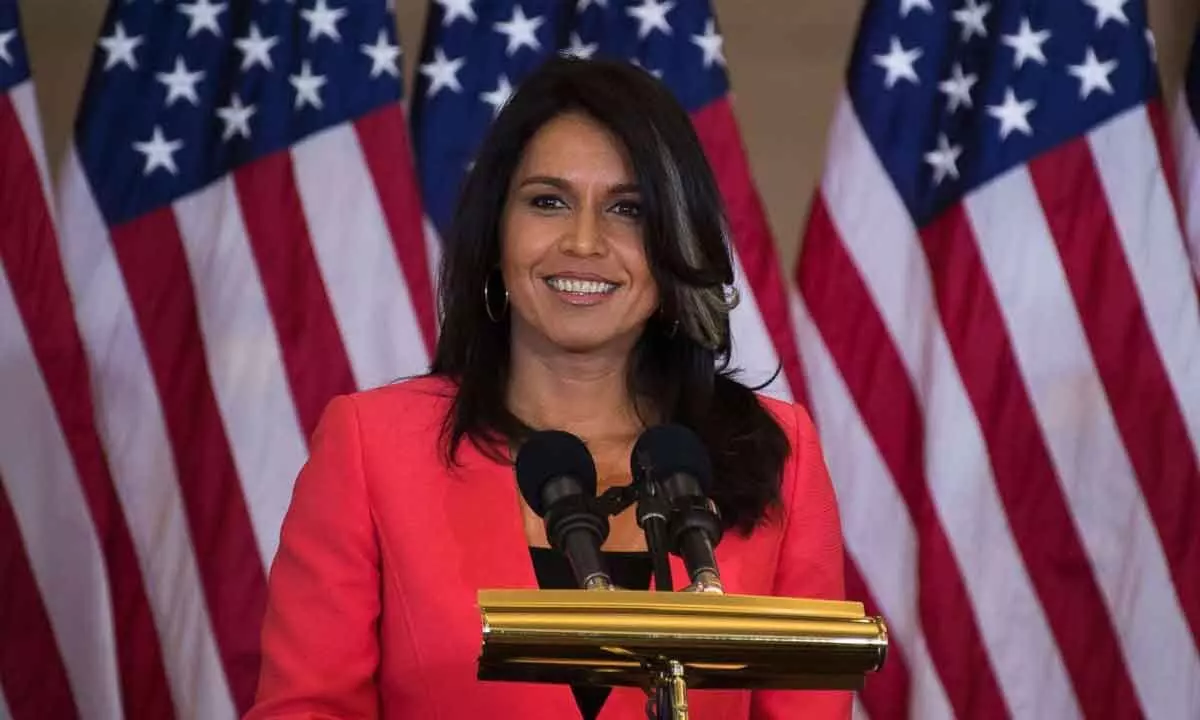Tulsi Gabbard on Bhagavad Gita’s Role in Leadership & Challenges

US Intelligence Chief Flags Rising Extremism in Bangladesh
US Intel Chief Tulsi Gabbard credits Bhagavad Gita for guiding her through leadership, intelligence work, and global challenges.
Newly appointed U.S. Director of National Intelligence, Tulsi Gabbard, on Monday underscored the Bhagavad Gita’s influence on her leadership and decision-making. Gabbard, known for her long-standing reverence for the Hindu scripture, emphasized that Lord Krishna’s teachings continue to serve as a source of strength amid professional and personal challenges.
“Whether in the battlefield or facing the complexities of intelligence work, I always turn to the wisdom of Lord Krishna in the Bhagavad Gita,” Gabbard said in an interview with ANI. She highlighted how the sacred text has provided clarity in high-stakes situations throughout her career.
Gabbard, the first Hindu elected to the U.S. Congress, has frequently spoken about her spiritual connection with the Gita. In 2020, she encouraged Hindu students to explore its core principles, particularly Bhakti Yoga and Karma Yoga, as pathways to selfless service and success. Her daily routine incorporates meditation, yoga, and scripture reading as part of her disciplined spiritual practice.
Meanwhile, Beijing has responded to Prime Minister Narendra Modi’s recent appearance on the Lex Fridman podcast, where he referenced the Bhagavad Gita’s teachings in governance and leadership. The Chinese government, through state-affiliated media, expressed concerns over Modi’s remarks on democracy, global leadership, and India’s role in the evolving world order.
China’s Foreign Ministry spokesperson stated that while India’s perspective on ancient philosophy is respected, comments on geopolitical stability must align with diplomatic protocols. The statement follows growing strategic competition between the two nations, especially in technology, trade, and border security.
Modi’s interview, which delved into historical wisdom and its relevance to contemporary leadership, gained significant global traction. Analysts suggest that Beijing’s response indicates a cautious approach toward India’s increasing influence on global platforms.
During her visit to India, Gabbard also addressed trade and security matters, emphasizing the importance of direct dialogue between Washington and New Delhi. Speaking at the Raisina Dialogue in New Delhi, she underscored economic collaboration and security cooperation as focal points of bilateral discussions.
“There is significant room to expand economic relations beyond tariff concerns. Both Prime Minister Modi and President Biden recognize the mutual benefits of a stronger partnership,” Gabbard noted.
She stressed that high-level engagements between Indian and U.S. officials are essential for fostering collaboration across intelligence, defense, commerce, and education sectors. Gabbard also highlighted the enthusiasm of private enterprises in both countries to deepen economic ties.
“The leadership in both nations is pragmatic. Direct communication at every level, from heads of state to cabinet discussions, is key to laying the groundwork for a robust partnership,” she said.
Gabbard’s visit reaffirms the U.S. commitment to strengthening ties with India across multiple domains, positioning both nations as strategic partners in global stability and economic growth.








